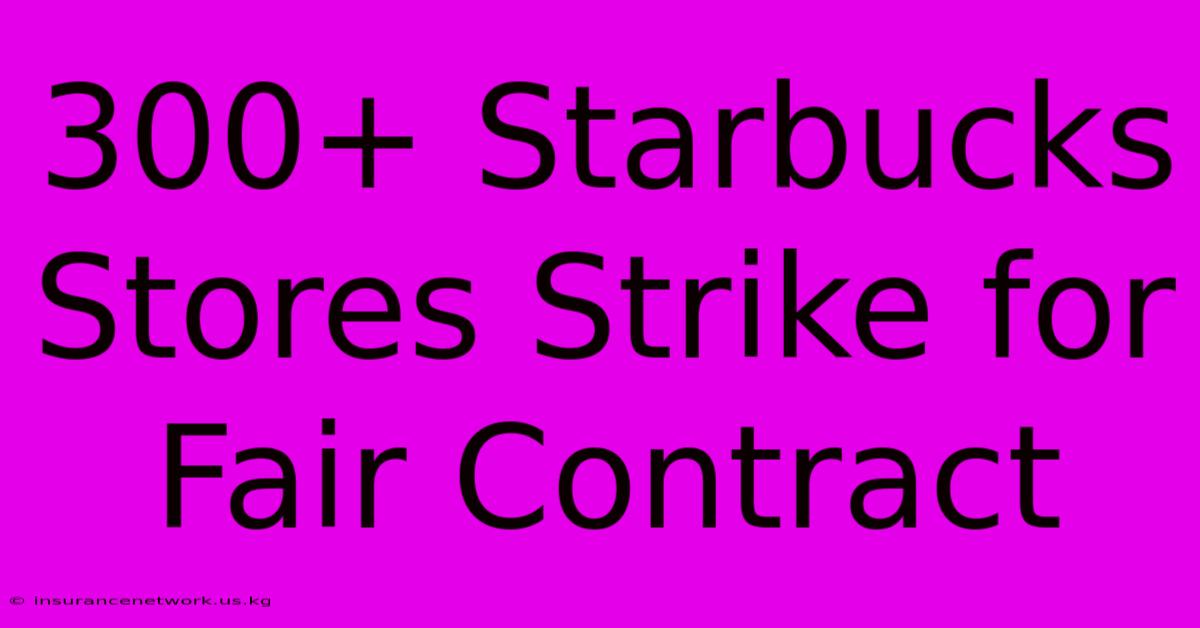300+ Starbucks Stores Strike For Fair Contract

Discover more detailed and exciting information on our website. Click the link below to start your adventure: Visit Best Website insurancenetwork.us.kg. Don't miss out!
Table of Contents
300+ Starbucks Stores Strike for Fair Contract: Workers Demand Better Wages and Benefits
Hundreds of Starbucks stores across the United States participated in a significant strike on [Insert Date of Strike], demanding improved wages, benefits, and working conditions. This coordinated action highlights the growing labor movement within the coffee giant and underscores the ongoing struggle for fair treatment in the service industry. The strike, involving over 300 locations and impacting thousands of baristas, represents a major escalation in the ongoing dispute between Starbucks workers and management.
Key Demands of the Starbucks Workers Strike
The striking workers are united in their call for a fair contract that addresses several key issues:
1. Higher Wages to Meet the Cost of Living
A central demand is a substantial increase in wages to reflect the rising cost of living. Many baristas report struggling to make ends meet on their current salaries, particularly in high-cost areas. They argue that Starbucks, a highly profitable company, can easily afford to pay its workers a living wage. This resonates with the broader national conversation about fair wages and economic inequality.
2. Improved Healthcare Benefits
Access to affordable and comprehensive healthcare is another crucial demand. Many workers currently face high deductibles and out-of-pocket expenses, leaving them vulnerable to financial hardship in case of illness or injury. The strikers are advocating for a healthcare plan that provides adequate coverage and reduces the financial burden on employees.
3. Safe and Respectful Work Environment
The strike also addresses concerns about workplace safety and respect. Reports of understaffing, excessive workloads, and inadequate training have been raised by workers. They are demanding a safer and more respectful work environment where they feel valued and supported by management.
4. Union Recognition and Bargaining Rights
A key element of the strike is the fight for full union recognition and effective collective bargaining. Starbucks has faced criticism for its alleged efforts to discourage unionization, including accusations of intimidation and unfair labor practices. The strikers are determined to secure their right to negotiate fair contracts and protect themselves from retaliatory actions.
The Impact of the Starbucks Strike
The large-scale strike has significant implications for both Starbucks and the broader labor movement:
-
Disruption to Starbucks Operations: The strike caused considerable disruption to Starbucks operations, with many stores forced to close or operate with reduced staff. This highlights the power of collective action and the potential impact of labor disputes on major corporations.
-
Increased Public Awareness: The strike brought increased public attention to the issues faced by Starbucks workers, generating sympathy and support from various segments of society. This heightened visibility can strengthen the workers' negotiating position and encourage broader support for worker rights.
-
Inspiration for Other Workers: The success of the Starbucks strike, even partially, can inspire similar actions by workers in other industries, potentially triggering a wave of unionization and labor activism.
-
Pressure on Starbucks Management: The strike puts significant pressure on Starbucks management to address the workers' demands and negotiate a fair contract. The negative publicity and potential financial losses associated with the strike could incentivize management to compromise.
The Future of the Starbucks Strike and Labor Relations
The outcome of this strike remains to be seen. However, it undeniably marks a significant moment in the ongoing struggle for fair labor practices within the service industry. The actions of these Starbucks workers serve as a potent reminder of the importance of collective bargaining and the power of workers to advocate for their rights. This ongoing situation is one to watch closely as it could set a precedent for future labor negotiations, not just within Starbucks, but across various sectors. The fight for fair wages, benefits, and working conditions is far from over, and the Starbucks strike is a critical chapter in that ongoing struggle.

Thank you for visiting our website wich cover about 300+ Starbucks Stores Strike For Fair Contract. We hope the information provided has been useful to you. Feel free to contact us if you have any questions or need further assistance. See you next time and dont miss to bookmark.
Featured Posts
-
Nfl Injury Update Flowers Johnson Status
Dec 26, 2024
-
Kelce Shows Tony Love After Touchdown
Dec 26, 2024
-
Swift Skipped Kelces Christmas Game
Dec 26, 2024
-
Review Eggers Nosferatu Adaptation
Dec 26, 2024
-
Watch Celtics Vs 76ers Live Streaming Options
Dec 26, 2024
